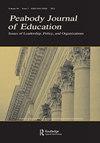The Higher Education Generation: World War I and the Truman Commission’s Path to Universal College Access
Q2 Social Sciences
引用次数: 0
Abstract
ABSTRACT The work of the 1946–1948 President’s Commission on Higher Education was unquestionably influenced by the immediate aftermath of World War II. In this article, we examine the backgrounds and ideas of 10 commissioners to argue that their efforts were also deeply influenced by their experience of a different world war. The 1914–1918 “Great War” was a formative experience for each of the members, shaping their views of sociopolitics, opportunity, and the public purposes of education. Ultimately, these commissioners arrived at the belief that universal college access was the key to ensuring peace and democracy throughout the world. Their product, Higher Education for American Democracy, was anything but a dry federal report. Instead, it was a passionate argument for what higher education ought to be. As such, it closely reflected the lived experiences of its authors, who had been shaped by one shattering conflict, were responding to a second, and were determined to prevent a third.高等教育一代:第一次世界大战与杜鲁门委员会的大学普及之路
摘要1946-1948年总统高等教育委员会的工作无疑受到了第二次世界大战直接后果的影响。在这篇文章中,我们考察了10位委员的背景和想法,认为他们的努力也深受他们在另一场世界大战中的经历的影响。1914年至1918年的“大战”对每个成员来说都是一次形成性的经历,塑造了他们对社会政治、机会和教育公共目的的看法。最终,这些委员们相信,普及大学教育是确保全世界和平与民主的关键。他们的产品《美国民主高等教育》绝不是一份枯燥的联邦报告。相反,这是一场关于高等教育应该是什么的激烈争论。因此,它密切反映了作者的生活经历,他们受到了一场毁灭性冲突的影响,正在应对第二场冲突,并决心阻止第三场冲突。
本文章由计算机程序翻译,如有差异,请以英文原文为准。
求助全文
约1分钟内获得全文
求助全文
来源期刊

Peabody Journal of Education
Social Sciences-Education
CiteScore
2.20
自引率
0.00%
发文量
43
期刊介绍:
Peabody Journal of Education (PJE) publishes quarterly symposia in the broad area of education, including but not limited to topics related to formal institutions serving students in early childhood, pre-school, primary, elementary, intermediate, secondary, post-secondary, and tertiary education. The scope of the journal includes special kinds of educational institutions, such as those providing vocational training or the schooling for students with disabilities. PJE also welcomes manuscript submissions that concentrate on informal education dynamics, those outside the immediate framework of institutions, and education matters that are important to nations outside the United States.
 求助内容:
求助内容: 应助结果提醒方式:
应助结果提醒方式:


